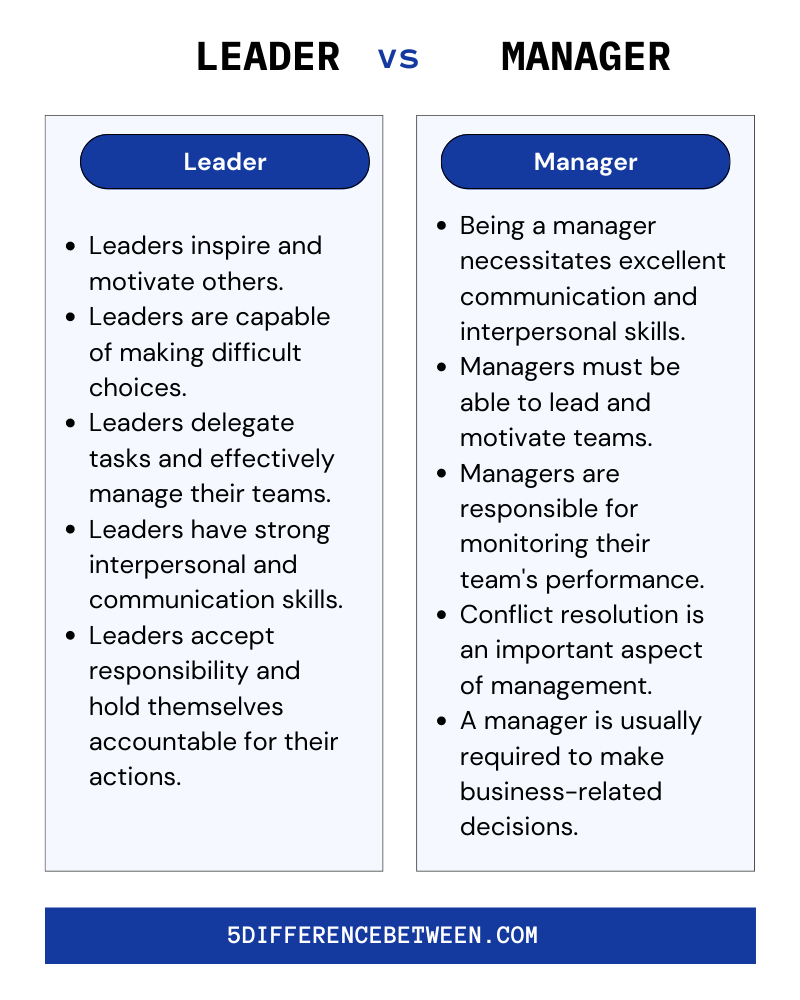Difference between management and leadership is quite simple. A leader and a manager are two distinct roles that require very different sets of abilities and characteristics. A manager is primarily concerned with the day-to-day operations of a business or organization, whereas a leader is more concerned with the overall direction and long-term vision of the organization. This essay will discuss five key differences between such a leader and a manager.
It will demonstrate how well a leader is concerned with inspiring and motivating team members to work toward a common goal, as opposed to managing resources to achieve specific objectives. It will also take into account how a leader is concerned with creating a positive culture whereas a supervisor is concerned with enforcing rules and regulations.
Who is a Leader and what is Leadership?
A leader is someone who can inspire and guide others toward a common goal. They have excellent communication skills, a thorough understanding of the organization, and the ability to motivate others. Leaders are frequently found in positions of authority and play an important role in determining the organization’s direction. They can take the initiative and make decisions that benefit the entire group and organization.
Leadership is defined as the ability to influence and motivate individuals and groups to achieve a common goal. It entails using skills like communication, problem solving, decision making, and creativity to achieve a desired result. Leaders understand their own strengths and weaknesses, as well as the strengths and weaknesses of those around them, and use this knowledge to foster a successful environment. Leadership is a process of connecting with others and developing relationships.
Also Read > Difference Between Heat and Temperature
Leaders must be able to communicate their vision effectively, motivate team members, and make decisions that benefit the group. Leaders must also understand the context in which they are leading and be able to create an environment conducive to the desired outcome. Leadership is a continuous process of learning, understanding, and adapting to changes in the environment. Leaders must be able to establish clear objectives, communicate those objectives to their teams, and then monitor and adjust as needed. It necessitates the ability to recognise and capitalise on the strengths of those around them, as well as ensure that everyone is working toward the same goal.
Who is a Manager and What is Management?
A manager is someone who is in charge of the day-to-day operations of a company, organization, or team. They are in charge of planning, organizing, leading, and controlling the organization’s activities in order to achieve predetermined goals. Managers typically create and execute plans, direct and motivate employees, monitor performance, and make decisions to ensure the success of the organization.
Management is an essential component of any company, organization, or institution. It is the art of organizing, directing, and controlling resources in order to achieve desired results. Management is the process of supervising and coordinating people’s efforts to achieve specific goals. Strategy, business processes, operations, human resources, finance, and marketing are all part of it. Management is the process of determining and ensuring that the organization’s goals are met. Setting objectives, developing plans to achieve those objectives, and determining the resources, such as personnel, equipment, and materials, required to complete the tasks are all part of the process. It also entails deciding how to use those resources and adjusting plans as needed.
Management also entails tracking and evaluating progress, problem solving, and making decisions about how to proceed in order to achieve the desired results. This includes both managing the organization’s resources (people, finances, and technology) and its operations (production, sales, and marketing). Effective communication is required for good management, both within the organization and with external stakeholders. It is also necessary to be able to motivate and lead a team, as well as collaborate with and negotiate with other teams.
Leader Vs Manager

Finally, both leaders and managers are critical to the success of any organization. In the role of balance leaders Vs managers the leaders set the tone for their teams and motivate them to achieve their goals, whereas managers coordinate resources and ensure that tasks are completed on time and within budget. Understanding the differences between a leader and a manager can help you better understand the dynamics of your team and how to get the most out of it.







2 Comments to “5 Difference Between Leader and Manager”